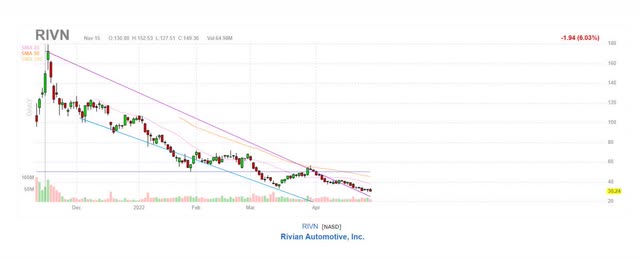I Was Wrong About Rivian Automotive Stock (NASDAQ:RIVN)
Michael M. Santiago/Getty Images News
Rivian Automotive Inc. (NASDAQ:RIVN) recently set new 52-week lows amid an escalating sell-off in the electric-vehicle sector, which was fueled by rising supply-chain risks. Despite the fact that Q1’22 production and delivery numbers, which I only recently discussed, were pointing in the right direction, the market currently has no appetite for high-multiple stocks.
Given the increased supply-chain risks, I wouldn’t be surprised if Rivian Automotive reduced its production forecast for 2022 once more.
Early Glimpse Into The Supply-Chain Suggests Guidance Risks Have Escalated
Rivian Automotive entered the stock market at a time when demand for electric-vehicle stocks was high and investors were willing to pay almost any price for the promise of increased market share and sales. However, since Rivian Automotive’s IPO at the end of 2021, the stock has consistently underperformed.
Rivian Automotive’s decline has accelerated since the company announced in February that it is reducing its production forecast for 2022 by 50% due to growing part sourcing issues.
Inflation is also affecting Rivian Automotive’s pricing structure, and the company announced price increases of up to 20% for the R1T pickup truck and the R1S SUV in March, much to the angst of reservation holders. Rivian Automotive’s management quickly backpedaled after customers complained about the price increases, but the damage had already been done.
According to the new production forecast, Rivian Automotive expects to produce only 25K electric-vehicles this year, down from an initial forecast of 50K that Rivian Automotive provided as a realistic production goal at the end of 2021.
However, growing supply-chain issues are causing problems for Rivian Automotive and its leadership, and those issues could get a lot worse before they get better in the short term. According to new delivery data made public by Chinese EV companies, the reemergence of Covid-19 had a significant negative impact on deliveries in April.
For example, NIO delivered only 5,074 electric-vehicles in April, compared to 9,985 in March, a troubling 49% decrease. Other EV companies’ deliveries have also been halted. The drop in delivery follows a significant drop in China’s auto market: auto sales fell 11.7% in March.
The drop in deliveries for Chinese EV companies like NIO is due to production disruptions caused by Covid-19, rather than weakening consumer markets or slowing economic growth. Manufacturing plants shut down across China in March and April, and authorities imposed new lockdown measures in major cities such as Beijing, Shanghai, and Shenzhen.
Disappointing delivery numbers from Chinese companies provide a glimpse into the severity of current supply-chain issues, and they may also point to more trouble for U.S.-based EV companies such as Rivian Automotive.
Worryingly, Rivian Automotive only recently reduced its production forecast by 50% for the same reasons that we have just learned have resulted in large volume declines for Chinese EV companies. As a result of these developments, Rivian Automotive’s production guidance may now be at greater risk, and the company may be forced to lower its outlook once more.
Earnings Are Not Going To Be Great
When it comes to electric-vehicle companies, investors must understand that they are valued based on their long-term sales potential rather than their current earnings. Scaling production and deliveries is critical for new companies like Rivian Automotive, which delivered slightly more than 1.2K electric-vehicles in 1Q-22. As a result, a reduction in production guidance, which is a proxy for expected future sales, is a very negative event for EV companies.
Rivian Automotive’s 1Q-22 earnings will be released on May 11, 2022, and the market expects the company to report a loss of $1.45 per share. Rivian Automotive will not be profitable this year or next. Having said that, the most important number revealed in Rivian Automotive’s 1Q-22 earnings release will be the estimated 2022 production number of R1Ts, R1Ss, and EDV commercial delivery vans.
Earnings Estimate (Rivian Automotive)
I Was Wrong About Rivian Automotive
I purchased Rivian Automotive stock at a much higher price than its current market price of $30. Unfortunately, RIVN has entered a down-channel in 2022, and the chances of an upsurge are not very high, especially in the current market, where sentiment is stacked against high-multiple growth stocks that are also dealing with a deteriorating supply-chain. The release of Chinese EV delivery data is also not helping, implying that Rivian Automotive will likely set new lows.
RIVN Share Price (Finviz)
I made the mistake of assuming that Rivian Automotive could scale production and deliveries without incident, and I didn’t give much thought to potential production constraints that are limiting the company’s growth.
In the long run, I still expect Rivian Automotive to be one of the preeminent electric-vehicle companies in the United States, owing to Amazon’s investment in the company, which resulted in a 100k vehicle order a while ago.
Why The Stock Of Rivian Automotive Could Rise
It is unlikely that the supply-chain crisis will be resolved quickly, but all crises will come to an end at some point. The supply-chain crisis may worsen in the short term, but it should not have a long-term impact on Rivian Automotive’s potential for sales growth in the electric-vehicle market or on the company’s valuation. Better-than-expected earnings per share or pre-orders next week, on the other hand, could cause the stock to rise despite more serious macro headwinds.
My Conclusion
The release of Chinese EV delivery data for the month of April provides investors with an early look at the supply chain, and it is not promising. Rivian Automotive is expected to report second-quarter earnings next week, and the company may lower its 2022 guidance yet again. In the short term, this would be disastrous for the stock.
Unfortunately, I made a mistake when I purchased Rivian Automotive at a much higher valuation. Even though I believe Rivian Automotive has long-term potential, the stock may face additional consolidation pressure.



